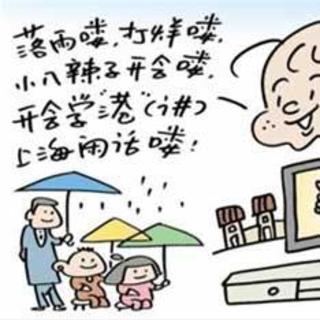
介绍:
Hello. Welcome to this edition of "In the Spotlight", a show featuring arts, culture and showbiz from right here in China. I'm your host, Li Ningjing.
First up on today's program, we are going to take a look at how Shanghai is saving its local dialect.
As the saying goes, one man's trash is another man's treasure. So next, we will take you to a recent vintage fair in Beijing to check out what the attraction was for the large crowd there.
Also, Luo Laiming will bring us his review of a popular Chinese romance film, Beijing Love Story.
Last, but not the least, we will introduce you a book called "Sent-down Youth"which may give you a glimpse of how young passion was embroiled into the ups and downs of the Cultural Revolution in the 1970s.
So, grab yourself a cup of tea, lay back and spend the next half hour with "In the Spotlight".
Anchor:
A recent report released by the Shanghai Statistics Bureau showed that more Shanghai residents can speak Mandarin than the local Shanghai dialect.
The report surveyed about 1,000 locals and non-locals aged 13 and over.
It showed that 97 percent of respondents could speak Mandarin, compared to about 80 percent who could also speak the Shanghai dialect.
But there is concern that the number of younger speakers of the Shanghai dialect is dropping rapidly.
Zhang Ru has more:
10-year-old Zhang Fengxi, the runner-up of the first "China's Got Talent" TV show in 2010, is known for her lively imitations of China's famous stand-up comedian, Zhou Libo.
The girl's dark sense of humor expressed in authentic Shanghai dialect impressed a lot of audience members.
However, not every Shanghai child can speak the dialect as good as Zhang, given that young children are required to speak mandarin in schools.
Zhang Fengxi is teaching her friends to say a tongue-twister in the Shanghai dialect. It's challenging for the two children, who are also Shanghai locals.
Huang Kaixuan is a member of Shanghai's well-known Little Star Arts Troupe. Having a good command of language skills, he often performs sketches on the stage. But how good is his Shanghai dialect?
Huang found it hard to read a small story in the Shanghai dialect. The little boy says he learns The Shanghai dialect from his grandparents, but he speaks with his parents in mandarin.
Huang's grandfather says his grandson is speaking "pidgin Shanghai dialect".
"They all speak mandarin at school, so he speaks pidgin Shanghai dialect at home. Sometimes, we even respond to him the same way."
The recent report on Shanghai residents' language abilities indicates that respondents between 13 and 20 scored 3.9 out of 5 in a Shanghai dialect listening test, 0.4 lower than the average score of all age groups.
Comedian Chen Guoqing is a household name in Shanghai, known mainly for his performances in the Shanghai dialect. Chen says the educational authorities should teach the Shanghai dialect in schools.
"Popularizing mandarin is very important because it's easier for people to communicate. But we should also preserve the Shanghai dialect. I don't mean that teachers should instruct classes in the dialect, but after normal classes, they can teach them Shanghai operas. If they need professionals to teach students, I am willing to do that, along with my colleagues."
Shanghai has been taking several measures to expand the use of the Shanghai dialect in the city, like introducing textbooks written in the language to primary schools, teaching games and songs at kindergarten level incorporating Shanghai dialect, broadcasting TV and radio programs and adding announcements in the dialect on some buses and in hospitals.
Xu Jun was a well-known Shanghai opera actor. Now, he is the chairman of the board of a private kindergarten. In his kindergarten, students have access to learning authentic Shanghai dialect.
"The parents of the children here are not locals, but the children can still learn the Shanghai dialect here. They will speak the Shanghai dialect to their parents at home. This way, children can also influence adults."
Now, the children are singing a poem-turned-song in the Shanghai dialect. The piece, "A Song of the Traveling Son," depicts a mother's love for her child.
Qian Nairong, a linguistic researcher in Shanghai, says dialects reflect nostalgia for culture.
"A dialect is also called a 'mother tongue.' The Mother tongue is the language you learnt when you sat on your mother's knees. It can express the subtlest feeling and it's nostalgic."
Nostalgia may very well be the charm and essence of a dialect. The Shanghai dialect has existed through the development of the city. The language has undergone three major integrations since Shanghai became an open port for trading in 1843. It's influenced by the dialects of its nearby cities and provinces, as well as by English, during the process of the city's opening-up. Now, as the economic hub is embracing a flood of newcomers, the Shanghai dialect is probably experiencing its new round of integration.
Back anchor:
That was Zhang Ru reporting. You are listening to "In the Spotlight".
大家还在听

